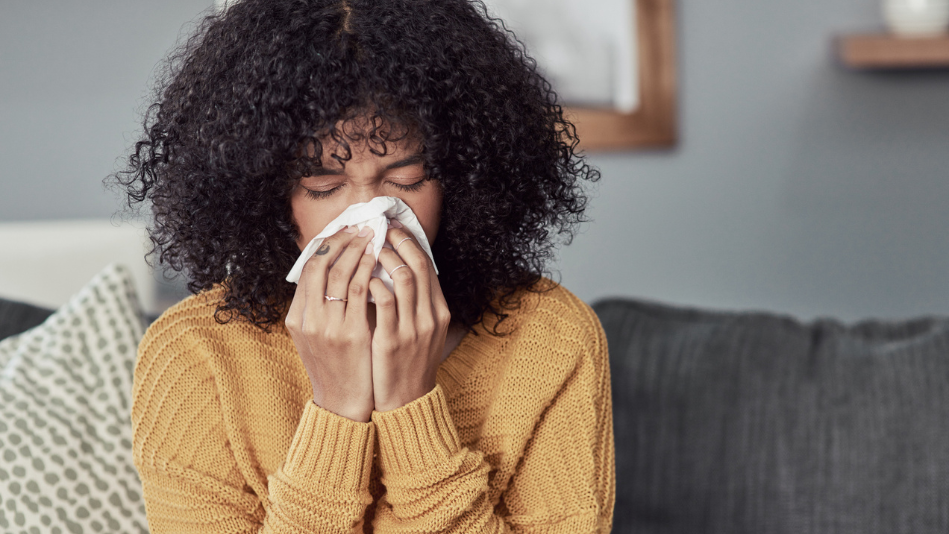The First Thing to Do When You Feel a Cold Coming On Is...
We asked 10 experts, from internists to immunologists, what you can to do to make the virus disappear a little sooner, and this was the near-unanimous answer.

Photo: LaylaBird/Getty Images
Drinking more water is more effective than popping zinc, eating chicken soup, cranking up the humidifier and loading up on saline nasal spray.
Do it as soon as you feel the scratch in your throat or that leaky faucet–like nasal drip telling you a wicked cold is coming your way. Be consistent—drinking a glass every 1 to 2 hours beats downing a few bottles the morning symptoms start and forgetting to drink again until the afternoon
The Surprising, Slightly Icky Reason
We need hydration to fight a cold because our body has to produce mucus to get rid of the virus, and we can't do that without a steady supply of fluids. Your respiratory tract is coated in mucus and tiny hair-like structures called cilia that push it up the tract, all the way from your lower lungs to your mouth. Viruses and infections are in the mucus, and you clear them by swallowing it and passing it through your digestive system, says Vincent Racaniello, PhD, professor of microbiology and immunology at Columbia University, who studies the common cold in his lab. (No one ever said getting over a cold was pretty).
Continuously drinking water keeps the mucus production flowing. That doesn't mean you have to keep a gallon at your desk and refill it several times a day; follow the tried-and-true advice of drinking enough fluids to keep your urine a pale yellow color. If it gets darker, you're falling behind, says Pritish Tosh, MD, infectious diseases physician at the Mayo Clinic in Minnesota and a member of the Mayo Vaccine Research Group. A doctor may be able tell if you're dehydrated through more unexpected tests like squeezing the skin on your forehead (called a skin turgor test), but these methods take training to do properly—looking at the color of your pee is much simpler.
Then Do This Tonight
Get at least 7 to 8 hours of sleep tonight (9 to 10 may help even more if you can swing it). Our experts said adequate rest was just as important as staying hydrated, though it's not always realistic to head back to bed right when cold symptoms hit.
In a recent study in Sleep, researchers tracked the sleep habits of healthy men and women for a week, then quarantined them and exposed them to the rhinovirus to see how many of them would catch it. Those who slept less were more susceptible. Sleep also helps mucus move viruses and infections up and out, but the simpler explanation is that when you're sleeping, your body can direct energy toward supporting your immune system, but when you're up and about, that energy is going to other essential functions, says Lipi Roy, MD, clinical instructor in medicine at Massachusetts General Hospital in Boston.
Follow those two pieces of advice and you'll be on track for a speedier recovery.
Do it as soon as you feel the scratch in your throat or that leaky faucet–like nasal drip telling you a wicked cold is coming your way. Be consistent—drinking a glass every 1 to 2 hours beats downing a few bottles the morning symptoms start and forgetting to drink again until the afternoon
The Surprising, Slightly Icky Reason
We need hydration to fight a cold because our body has to produce mucus to get rid of the virus, and we can't do that without a steady supply of fluids. Your respiratory tract is coated in mucus and tiny hair-like structures called cilia that push it up the tract, all the way from your lower lungs to your mouth. Viruses and infections are in the mucus, and you clear them by swallowing it and passing it through your digestive system, says Vincent Racaniello, PhD, professor of microbiology and immunology at Columbia University, who studies the common cold in his lab. (No one ever said getting over a cold was pretty).
Continuously drinking water keeps the mucus production flowing. That doesn't mean you have to keep a gallon at your desk and refill it several times a day; follow the tried-and-true advice of drinking enough fluids to keep your urine a pale yellow color. If it gets darker, you're falling behind, says Pritish Tosh, MD, infectious diseases physician at the Mayo Clinic in Minnesota and a member of the Mayo Vaccine Research Group. A doctor may be able tell if you're dehydrated through more unexpected tests like squeezing the skin on your forehead (called a skin turgor test), but these methods take training to do properly—looking at the color of your pee is much simpler.
Then Do This Tonight
Get at least 7 to 8 hours of sleep tonight (9 to 10 may help even more if you can swing it). Our experts said adequate rest was just as important as staying hydrated, though it's not always realistic to head back to bed right when cold symptoms hit.
In a recent study in Sleep, researchers tracked the sleep habits of healthy men and women for a week, then quarantined them and exposed them to the rhinovirus to see how many of them would catch it. Those who slept less were more susceptible. Sleep also helps mucus move viruses and infections up and out, but the simpler explanation is that when you're sleeping, your body can direct energy toward supporting your immune system, but when you're up and about, that energy is going to other essential functions, says Lipi Roy, MD, clinical instructor in medicine at Massachusetts General Hospital in Boston.
Follow those two pieces of advice and you'll be on track for a speedier recovery.



